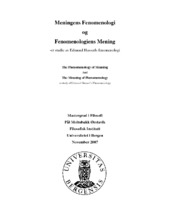Meningens Fenomenologi og Fenomenologiens Mening - et studie av Edmund Husserls fenomenologi
| dc.contributor.author | Ørstavik, Pål Moltubakk | eng |
| dc.date.accessioned | 2008-11-14T15:16:44Z | |
| dc.date.available | 2008-11-14T15:16:44Z | |
| dc.date.issued | 2008-11-14 | eng |
| dc.date.submitted | 2007-11-20 | eng |
| dc.identifier.uri | https://hdl.handle.net/1956/3011 | |
| dc.description.abstract | From a phenomenological point of view, 'meaning' is on the one hand something objective, irreal or ideal. On the other, meaning is something which is manifest in human action and expression. On a linguistic level, Husserl employs a distinction similar to Freges 'sense and reference' distinction. Contrary to Frege, Husserl also employ a theory of intentionality, which serves to anchor 'meaning' in the pre-predicative experiences of the world and its objects. Husserls transcendental turn, after Logical Investigations, is a turn towards the synthesis which always already are operative in the pre-predicative perceptual experience, and in which an anticipation towards cognition, knowledge and truth already are manifest. These serve as the basic foundation from which judging in general proceeds. | en_US |
| dc.format.extent | 263420 bytes | eng |
| dc.format.mimetype | application/pdf | eng |
| dc.language.iso | nob | eng |
| dc.publisher | The University of Bergen | eng |
| dc.title | Meningens Fenomenologi og Fenomenologiens Mening - et studie av Edmund Husserls fenomenologi | nob |
| dc.type | Master thesis | |
| dc.rights.holder | Copyright the author. All rights reserved | |
| dc.rights.holder | The author | eng |
| dc.description.degree | Master i Filosofi | |
| dc.description.localcode | MAHF-FILO | |
| dc.description.localcode | FILO350 | |
| dc.subject.nus | 713505 | eng |
| dc.subject.nsi | VDP::Humaniora: 000::Filosofiske fag: 160::Filosofi: 161 | |
| fs.subjectcode | FILO350 |
Tilhørende fil(er)
Denne innførselen finnes i følgende samling(er)
-
Department of Philosophy [235]
